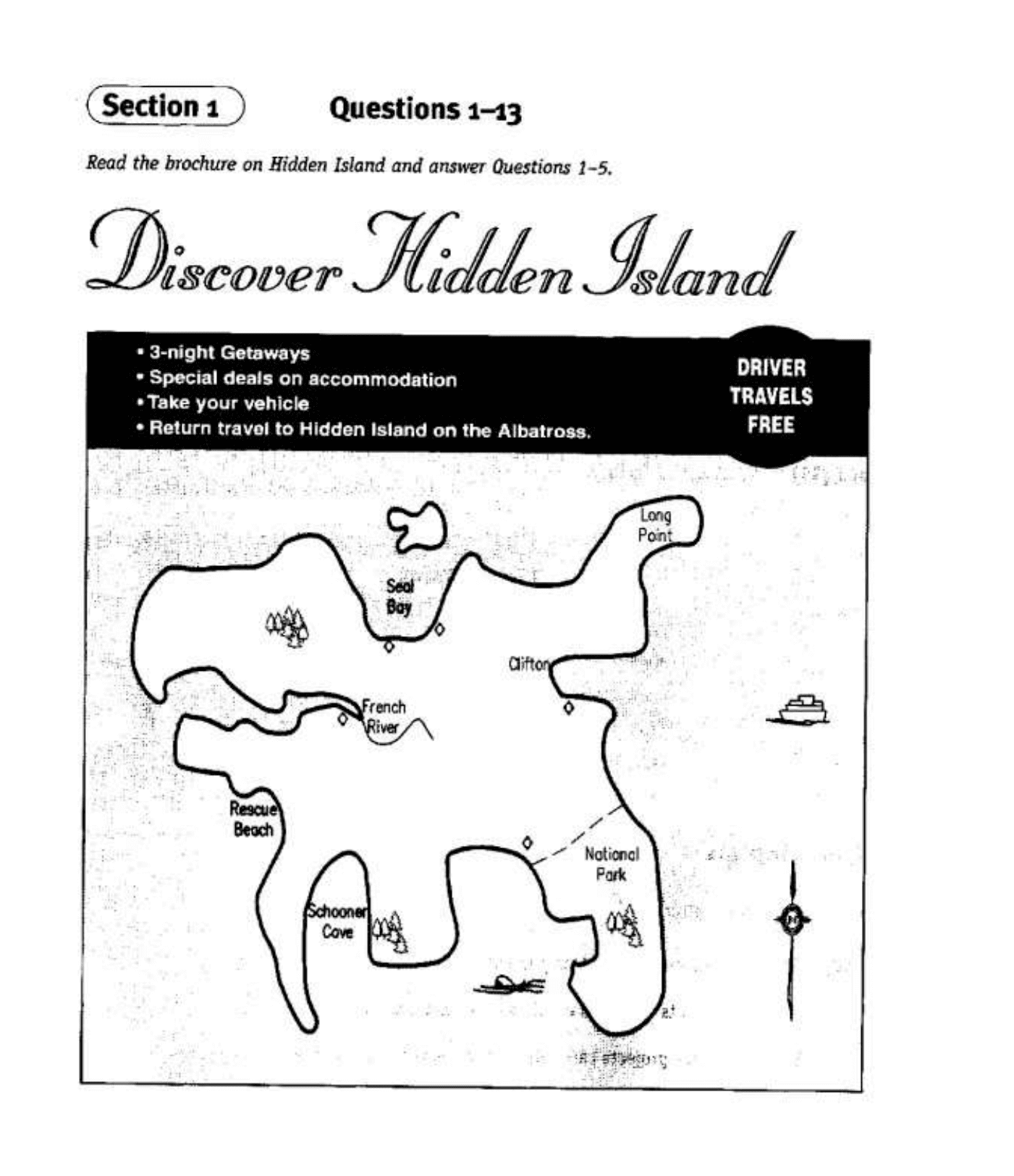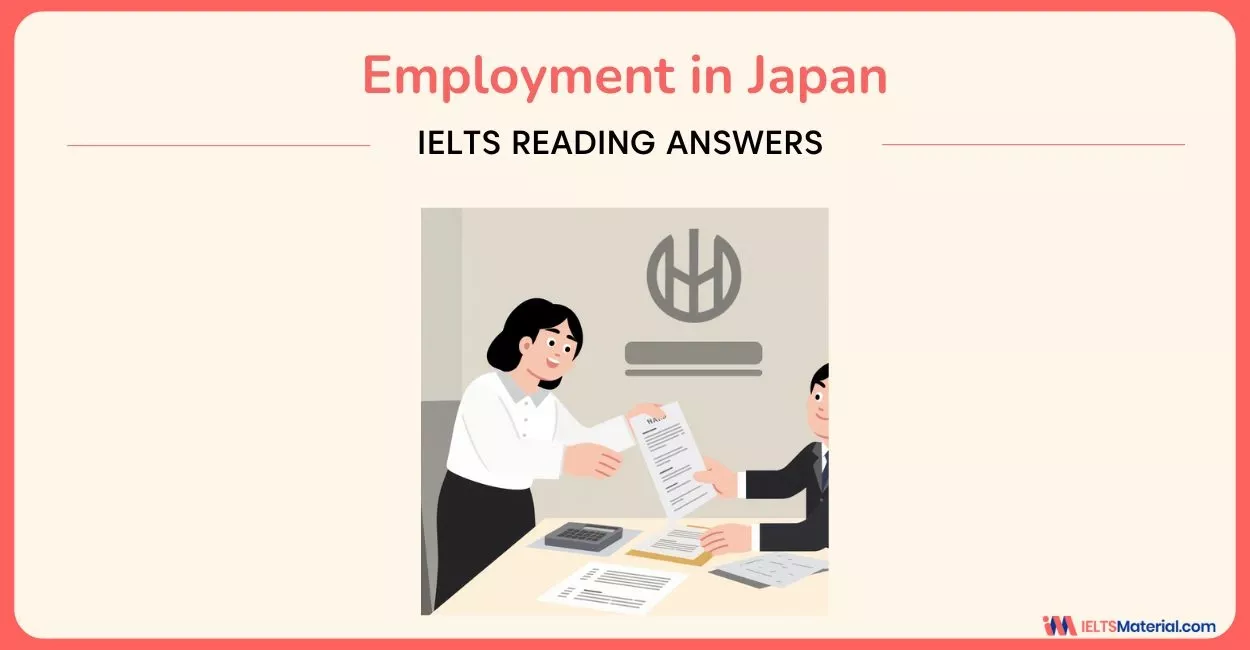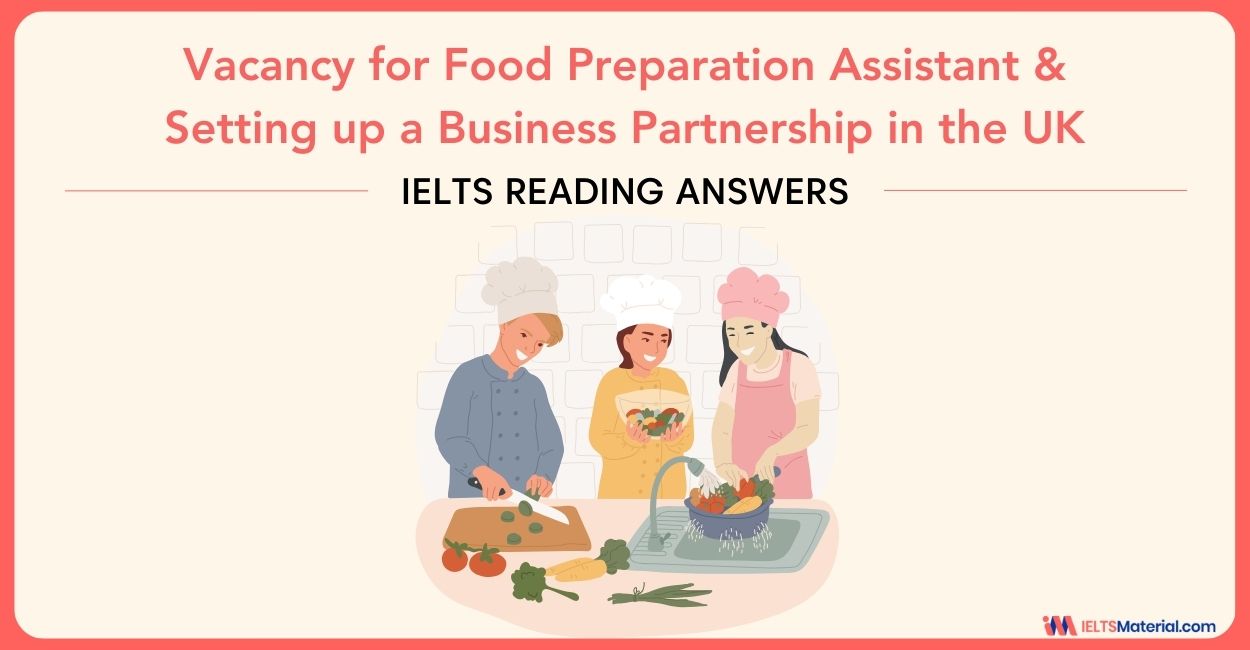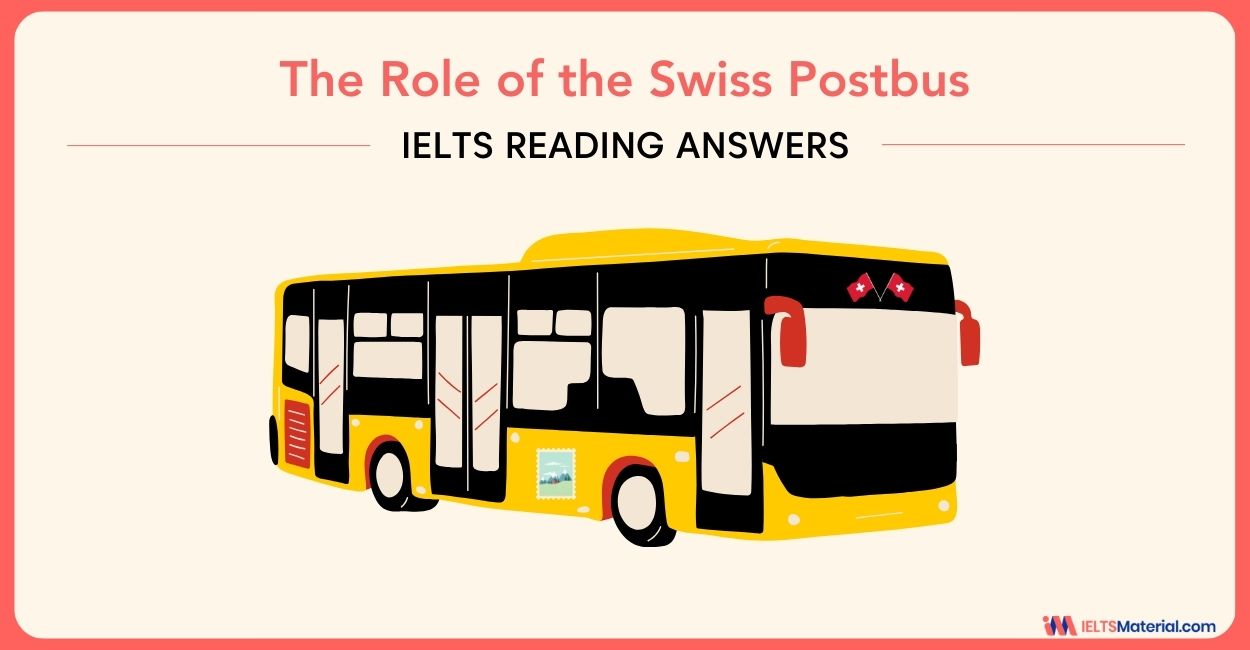Discover Hidden Island, A career in Hotel Management and Recipe for Long Life | General Reading Practice test 1 with Answers
14 min read
Updated On
-
Copy link
By attempting the Discover Hidden Island, A career in Hotel Management and Recipe for Long Life | General Reading Practice test 1 with Answers, level up your practice and aim to ace the IELTS Reading exam.
Table of Contents

Limited-Time Offer : Access a FREE 10-Day IELTS Study Plan!
The IELTS Reading Module can be the top-scoring category, with diligent practice. To achieve the best results in this section, you must understand how to approach and answer the different Question types in the Reading Module. By solving the reading practice tests and reviewing Sample Reading Questions from IELTS General Reading Practice Tests, you can ensure that your Reading skills are up to the mark.
The IELTS General Training Reading will give you 60 minutes to complete 3 sections where the question subject will be everyday/ general topics.
Section 1
Discover Hidden Island

A The Oceanrest motel at Seal Bay for $205 per person (twin-share).
B The Ferry Hotel in Clifton for $211 per person (twin-share).
C Seabreeze Hotel at Seal Bay for $252 per person (including full breakfast).
D Island Escape Lodge at French River for $314 per person (twin-share), water view, includes continental breakfast.
E Sanctuary Beach self-contained cabins for $273.50 (twin-share) also include chocolates, wine, a tour of the nature reserve and $10 meal voucher.
Questions 1-5
1 You want accommodation close to the ferry boat terminal………………………..
2 You are looking for the least expensive place to stay…………………………
3 You have heard that the best spots are on the south coast…………………………
4 You want to be sure to have a good view from your room…………………………
5 You like the idea of a big breakfast…………………………
Questions 6-10
List of Questions
- Do I have to reveal my medical history?
- Does the plan cover lost luggage?
- If I want to stay longer, can I extend my policy?
- Can I travel anywhere in the world?
- What is not covered?
- What if I have an emergency or claim?
- How much will it cost?
- Why do I need travel insurance?
- Can I buy insurance after I’ve begun my travel?
- In what situations am I covered while traveling?
Example: Heading ‘A’ – 8
6 Part B ……..
7 Part C ……….
8 Part D ………..
9 Part E………….
10 Part F…………
Questions 11-13
11 What item is covered in addition to health and medical expenses?————————
12 In what situation is accidental injury not covered? ___________________
13 What is special about the coverage for the United States? _________________
Youth Adventure Package
Travel Insurance
Don’t let anything spoil your fun! Your vacation is all about exploring, adventure and fun. You want to see new places and try new things.
The Youth Adventure Package is an affordable ‘just in case’ backup plan, so you aren’t hit with unexpected medical costs while on the adventure of a lifetime. You’ll be a long way from home. If you have an unexpected illness or, accidental injury, well be there to help and ensure you get the care you need.
Our emergency travel assistance services are available from anywhere in the world at any time of the day or night.
- Even for young healthy travelers, sickness or accidental injury can happen at any time. Charges for hospital stays can be thousands of dollars per day not including doctor’s fees and diagnostic services. This easily adds up to a devastating financial loss. You are on the adventure of a lifetime and don’t want to be burdened with a medical bill or to pay for lost or stolen luggage.
- Travel insurance is intended to cover sudden, unexpected and unforeseeable circumstances. Your plan is comprised of 4 different coverages. For more information, please read the Benefits under each.
- The Youth Adventure Package does not cover everything. This insurance has some exclusions. You should read and understand them before you travel. Prior-existing medical conditions may be excluded. Any medical condition you are aware of prior to the effective date of coverage, whether diagnosed or not, may not be covered. Sickness or accidental injury that occurs as a result of the use of alcohol or illegal drugs is not covered.
- We are dedicated to protecting your privacy. Your medical history will be collected when required and will only be used or disclosed for the purpose of adjudicating the claim.
- Yes, you can. Just call your agent no sooner than 7 days prior to the expiry of your policy. You can purchase an extension if you are in good health and have not filed any claims on the policy.
- You are covered for any country outside of the USA. However, transit for 5 days only is allowed through the USA.
Also check :
Section 2
A Career in Hotel Management
Introduction
Hotel management provides exciting career opportunities in the dynamic hospitality and tourism industry. Indeed, tourism is the world’s fastest-growing industry. Recent figures show tourism enjoying a growth rate 23% higher than that of the global economy, employing some 212 million and earning in the region of $ US 3.4 trillion per annum.
In a year from now, employment figures are predicted to exceed 338 million, with revenue above SUS7.2 trillion. The vast majority of new jobs will be in the Asia-Pacific region, which by the year 2010 will attract 1 in every 5 of the world’s holidaymakers. The employment prospects for the International College of Hospitality Management’s graduates are exciting.
The International College of Hospitality Management
The International College of Hospitality Management provides diploma and degree level hotel management training for the international hospitality and tourism industry. Established in 1993, the International College of Hospitality Management in the Asia-Pacific Basin campus of the renowned European Hotel Association. It also incorporates the classical French cooking training of Le Gourmet, Paris.
International Hotel Management Diploma
The International College of Hospitality Management course is industry-oriented, balancing operative, supervisory and management level training. The Diploma course is 3 years full time. Semesters 1, 3 and 5 are spent studying on campus, and Semesters 2, 4 and 6 are spent in industry on undergraduate placements, called ‘stages’. One stage may be taken up with language studies.
Bachelor of Business (Hotel Management) Degree
Students who graduate with the International Hotel Management Diploma are assured of a further year of Degree Study at the University of the Antipodes. Studies will focus on such areas as Global Marketing, Strategic Management, Total Quality Management, Cross-Cultural Communications, Developing Organisations and Management of Change, Global Development in Hospitality and Tourism, Intercultural Relations. Under certain circumstances the final year of study can be conducted on a part-time basis and by distance education mode, enabling students to study while maintaining a full-time career in the hospitality industry, either here or in their home country.
Questions 15-18
15 The hospitality industry
16 The College
17 The Diploma course
18 The Degree course
List Of Phrases
A…includes work experience placements overseas.
B …can be done by distance mode.
C …requires foreign language studies.
D …has links with overseas institutions.
E …must be completed in Australia.
F …combines study with industry placements.
G …offers expanding opportunities for employment.
H …must be completed in one year.
I …takes 3 years to complete, part-time.
J …consists of several campuses.
Read the passage below and answer Questions 19-23.
Training Facilities
The International College of Hospitality Management has more than 120 professional lecturers and international-standard, training facilities. These include three public restaurants, ten commercial training kitchens, simulated front office training facilities, four computer suites, a fully operational winery, and a food science laboratory. The Learning Resource Centre collection is extensive. The student support services provide professional counselling in the areas of health, learning support, language skills, accommodation and welfare. Childcare facilities are also available on campus.
International Home
The International College of Hospitality Management has students enrolled from more than 20 countries, some of whom stay on campus in International House. Built-in 1999, International House is accommodation comprising villa-style units. Each student has their own bedroom, sharing en suite facilities with another student. An adjoining kitchenette and lounge area is shared by the four students in the villa. All meals are served in the College dining room which is next to the student common room. Student privacy and security are priorities. A computer outlet in each bedroom enables the student to connect into the College network, providing 24 hour-a-day access. The residence is a two-minute walk to the College’s sporting and training facilities and is on a regular bus service to the city centre 10 km away. International House is also being used to enhance on-campus training, from Monday to Friday, Year 1 students, supervised by 2nd Years, are assigned kitchen, waiting, housekeeping and receptionist duties.
Simulated check-in/check-out exercises, receptionist duties and breakfast service to a limited number of rooms are also part of the program.
Questions 19-23
Look at the following statements. Write:
YES if the statement is correct according to the passage
NO if their statement is incorrect according to the passage
NOT GIVEN if the information is not given in the passage
19 The training facility has 10 kitchens. ………………….
20 All students in the program live at International House…………………….
21 Four students share a unit in the residence………………………….
22 The residence is used as part of the training program……………………
23 All meals in the residence are prepared by the students…………………….
Questions 24-27
List of Course Titles
Food and Wine Service
Housekeeping Procedures
Cocktails and Mixed Drinks
Hôtel Front Office Management
Bars and Service of Drinks
Resort Opération and Management
Catering Control
Hotel Front Office Reception
24 Course A _______________
25 Course B _______________
26 Course C _______________
27 Course D_______________
Look at the passage below and answer Questions 24-27 on the previous page.
INTERNATIONAL HOTEL
MANAGEMENT DIPLOMA
Short Courses
A. This certificate is designed for participants wishing to acquire the skills to perform duties relevant to a front office receptionist working within a range of hospitality establishments. The course includes: front office and organizational structure, role and duties of the front office personnel, guests’ reservations and registrations, check-in and check-out procedures, guest accounting and management reports.
B. This certificate is designed for participants wishing to develop a solid understanding of, and the ability to perform duties and skills required in the advanced front office operations and night auditing. The course includes: night auditing procedures, daily records and reports, early and late arrivals, security duties, bell desk/concierge, guest service and information, advanced cashiering, supervision of payments, banking operations, debtor control and financial reports.
C. This certificate is designed for participants wishing to acquire the skills relevant to table attendant duties within an a la carte restaurant. The course includes table setting for a variety of menus, plate and silver service, tray and wine service, ordering and docket systems, wine styles and label identification, food and wine combinations.
D. This certificate is designed for participants wishing to acquire the skills to perform a bar attendant’s duties within the range of industry settings. Course includes: bar preparation, cash handling, beer service, patron care, basic cocktail mixing, product knowledge.
Section 3
Read the passage below and answer Questions 28-40
Recipe for Long Life
There is a place where 100-year-olds live in their own homes and tend their own gardens and where the three leading killers in western culture (heart disease, stroke and cancer) occur with the lowest frequency in the world. People maintain a healthy weight without dieting throughout life. This place is the Japanese island-state of Okinawa, home to the healthiest people on Earth. A 25-year research project, the Okinawa Centenarian Study, found that there are more than 400 people aged 100 or older in a population of 1.3 million. In the United States, there are only 65-130 centenarians in a comparably sized sample, most of whom can no longer live alone.
How have the Okinawans managed to do all this? Simple: their lifestyle habits are extremely healthy. First, they eat a plant-based diet high in unrefined carbohydrates. This gives them protection against heart disease, cancer, stroke and weight gain. Even if you are not an Okinawan and don’t live anywhere near a peaceful tropical island, there is something you can still do, adopt some of the Okinawans’ habits, especially their dietary habits. The evidence presented in the Okinawa Centenarian Study reveals that what you eat as well as how you live and think has a huge impact on your health, weight, energy, stress level and life expectancy. Here’s how to eat like an Okinawan:
Nutrition research consistently shows that a high-carbohydrate, plant-based diet is best for long-term health and weight maintenance. Aim for eight to 10 serving of whole grains a day. Westerners eat mostly refined grains: bleached flour products such as white bread, cookies and cakes, and white rice, which have little or no fibre. Whole grains (brown rice whole-wheat bread for example) are unrefined carbohydrates which contain lots of fibre. Unrefined carbohydrates do not cause obesity. Instead, they provide essential fuel for the brain, central nervous system and muscles, plus nutrients that decrease the risk for heart disease, diabetes and cancer. Their fibre content helps you feel full and carries waste products through your digestive tract more quickly, so whole grains can help you lose weight. If the grain is white, the chances are it’s refined and no longer a “whole” grain, which tends to be and ranges in colour from light to dark brown. Grains you should add to your diet include brown and wild rice, barley, oats, kasha, quinoa, bulgur and buckwheat.
Vegetables are a major antioxidant, which reduces cell damage from free radicals responsible for the ageing process. Plants contain antioxidants in abundance, but some more than others. The elder Okinawans eat a lot of carrots, cabbage, onions, sweet potatoes, sweet peppers and sprouts. Fruits are fine as well, but no more than 4 servings. A diet hill of vegetables and fruit will keep you looking younger and living longer. It doesn’t matter which ones you choose, just make sure you eat a variety of vegetables and fruits.
Flavonoids, plant compounds found in soy products, flaxseed and tea, to name a few sources, are powerful antioxidants, Theoretically, they provide a weak form of estrogen where the body needs it and block the body’s own estrogen in locations where estrogen may feed cancer. The importance of flavonoids is only beginning to take hold in the medical research community. A high blood level of flavonoids can be maintained by eating 24 servings of these products a day. Other flavonoid-rich foods readily available include onions, snow green beans, cranberry juice, apple sauce.
Aim for three servings of calcium-rich foods daily. Calcium strengthens bones and prevents osteoporosis, Good vegetarian sources are green leafy vegetables and tofu. Dairy products are also excellent sources of calcium, but consume them in moderation. Surprisingly, osteoporosis rates are lower in societies where people eat few, if any, dairy products. The type of saturated fat in whole-fat dairy products is one of the worst offenders for making cholesterol in the body So, go for low-fat varieties, preferably two dairy servings a day and try one of the vegetarian sources as your third calcium serving.
Unless you’re eating fish or flax several times a week, you’re probably not getting enough omega-3 fatty acids, which are critical for maintaining optimal performance of the brain, cardiovascular system and immune system. You can get adequate amounts by eating fish rich in omega-3 fatty acids several times a week. are generally the darker-fleshed fish like salmon, tuna and mackerel. If you’re a vegetarian, you can get omega-3s from walnuts. If you’re a meat-eater, you should try to make the switch to fish. The omega-3s in fish can help prevent clots from forming in coronary arteries and elsewhere.
Use 1 -2 tablespoons of monounsaturated vegetable oils dally. The problem is not how much fat you eat, but what kind. The highly-rated Mediterranean diet is high in fat but low in health risks because the fat in that diet is monounsaturated, the heart-healthy, good-for-you fat. “Bad” fats, the kind that clog arteries are saturated fat, derived mostly from animal sources like red meat and dairy plus trans fats, found in margarine french fries, chips and cookies. Olive, canola and flaxseed oil which reduce the bad and boost the good cholesterol, are all high in monounsaturated fats, as are avocados and almonds. Canola is the Okinawans’ oil of choice.
Up to seven servings a week of high-protein meats, poultry and eggs are fine too; don’t eat red meat every day; three times a week is plenty.. and choose lean cuts about three servings a week. Women should have no more than one alcoholic beverage a day, men two. Red wine is best as it contains compounds thought to protect against heart diseases and osteoporosis. Drink enough water so that your urine is clear, whether it 8 glasses a day or 12. If you’re physically active, you’ll need even more.
Okinawans eat food that is high in unrefined carbohydrates and fibre, but they tend to stop eating before they are full. They call their secret ‘hara hachi bu’, which loosely translates to ‘eat until you are eight parts full (out of ten).’ Simply put, leave a little room at the end of each meal. In addition to eating healthily, I feel exercise is a way of life. They take up martial arts and traditional dance when young and continue these activities throughout their lives; most also garden and walk. Okinawans have a deep respect for nature and believe they have an obligation to help others. These relationships with nature and community are powerful: research shows that they help extend life and lower disease risk. These are concepts that we can and should integrate into our daily lives to maintain our physical, emotional and spiritual health.
Questions 28-31
Choose the correct answer 1-4.
28 From the research project it was found that…
- All of Okinawa’s centenarians are still living independently.
- Okinawa has the lowest rate of cancer in the world.
- Over 400 centenarians live in Okinawa.
- Okinawa has more centenarians than any other country.
29 Which of the following does NOT contain flavonoids?
- yoghurt
- green tea
- soy milk
- cranberries
30 Fats that are good for you…
- come from meat and dairy products
- produce no cholesterol
- are not found in vegetable oils
- are found in avocados and almonds
31 Okinawans believe that it is advisable to…
- eat less, 8 meals out of 10
- eat smaller, more frequent meals
- stop eating before you are full
- eat until you are full
Questions 32-35
32 protein _____________
33 saturated fats _____________
34 unrefined carbohydrates __________________
35 whole fat dairy _____________
List
- should be avoided
- once a week
- no more than 3 times a week
- once a day
- 2-4 servings per day
- 8-10 servings a day
Questions 36-38
36 Carbohydrates can help you lose weight
37 Soy products and tea contain flavonoids
38 To protect the immune system and brain function
List of Phrases
A ..drink red wine regularly.
B ..to help keep a youthful appearance.
C ..vegetarians can eat walnuts.
D ..because they move waste through the digestive system.
E..as long as they are unrefined.
F ..to keep your arteries clear.
G.. which are antioxidants.
Question 39 and 40
In addition to diet and exercise, the connection to 39 ……………..and 40………………..contributes to the well-being and long lives of Okinawans.
Answer Key
Unlock Answers
Section 1
| 1 | B |
| 2 | A |
| 3 | E |
| 4 | D |
| 5 | C |
| 6 | 10 |
| 7 | 5 |
| 8 | 1 |
| 9 | 3 |
| 10 | 4 |
| 11 | lost/stolen luggage |
| 12 | alcohol/illegal drugs |
| 13 | transit (only)/5 days transit |
Section 2
| 15 | G |
| 16 | D |
| 17 | F |
| 18 | B |
| 19 | Yes |
| 20 | No |
| 21 | Yes |
| 22 | Yes |
| 23 | No |
| 24 | viii |
| 25 | iv |
| 26 | i |
| 27 | v |
Section 3
| 28 | 3 |
| 29 | 1 |
| 30 | 4 |
| 31 | 3 |
| 32 | 4 |
| 33 | 1 |
| 34 | 6 |
| 35 | 1 |
| 36 | E |
| 37 | G |
| 38 | C |
| 39 | nature/community |
| 40 | nature/community |
Continue with…Practice Test 2

Start Preparing for IELTS: Get Your 10-Day Study Plan Today!
General Reading Practice Tests

Nehasri Ravishenbagam

Kasturika Samanta
Recent Articles

Kasturika Samanta

Kasturika Samanta


Kasturika Samanta






Post your Comments
10 Comments